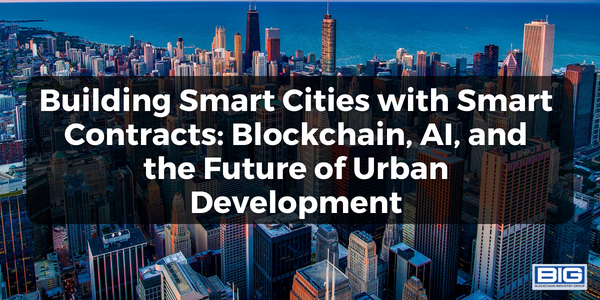
As the world rapidly urbanizes and cities face unprecedented challenges, innovative technologies are emerging as powerful tools for urban development. Among these technologies, blockchain and artificial intelligence (AI) are revolutionizing the way cities operate and interact with their residents.
In particular, the integration of smart contracts, blockchain-based self-executing contracts, is paving the way for the creation of smart cities. By combining the capabilities of blockchain, AI, and smart contracts, urban areas can efficiently manage resources, enhance citizen services, and foster sustainable growth.
Blockchain and Smart Contracts: Transforming Urban Governance
Blockchain technology provides a decentralized and transparent platform for secure data sharing and transaction management. When combined with smart contracts, blockchain becomes a catalyst for transforming urban governance. Smart contracts, powered by blockchain, enable the automation and self-execution of agreements without the need for intermediaries. They hold great potential for streamlining administrative processes, improving accountability, and enhancing citizen participation in urban decision-making.
Example: Streamlining Permitting Processes
Imagine a scenario where a developer wants to construct a new building in a city. Traditionally, obtaining the necessary permits involves a lengthy and cumbersome bureaucratic process. However, by leveraging smart contracts, the developer can submit all the required documentation and payments electronically. The smart contract, encoded with predefined rules and conditions, automatically verifies the compliance of the application, triggering the issuance of permits upon meeting the criteria. This eliminates the need for manual reviews, reduces processing time, and enhances transparency.
AI-Powered Data Analytics: Enhancing Urban Efficiency
AI plays a vital role in creating intelligent and efficient cities. By analyzing vast amounts of data collected from various urban systems and IoT devices, AI algorithms can extract valuable insights, optimize resource allocation, and improve urban services. Combining AI with blockchain technology provides a secure and decentralized framework for data sharing, enabling cities to harness the power of AI while preserving data privacy and security.
Example: Optimizing Traffic Management
Traffic congestion is a common challenge faced by many cities. By leveraging AI and blockchain, cities can implement intelligent traffic management systems that dynamically adapt to changing traffic conditions. AI algorithms can analyze real-time data from sensors, cameras, and other sources to identify traffic patterns and predict congestion. Smart contracts integrated with this system can autonomously adjust traffic signals, reroute vehicles, and optimize traffic flow in real-time, reducing congestion and improving overall transportation efficiency.
The Future of Urban Development: Smart Cities 2.0
The convergence of blockchain, AI, and smart contracts is paving the way for Smart Cities 2.0, where urban areas become interconnected ecosystems that prioritize sustainability, efficiency, and citizen well-being. In Smart Cities 2.0, citizens actively participate in decision-making processes, and their interactions with urban systems generate valuable data that fuels innovation and enhances urban services.
Example: Citizen-Driven Energy Grids
Creative Arts and the Disruptive Impact of AI
—
Education Professionals and the Disruptive Impact of AI
—
Financial Services and the Disruptive Impact of AI
Smart contracts integrated with blockchain technology can empower citizens to become active participants in the energy grid. By generating renewable energy through rooftop solar panels, citizens can sell their excess energy to the grid through smart contracts. These contracts automatically validate the energy production, calculate payments, and securely transfer funds, creating a peer-to-peer energy marketplace. This democratization of energy production and distribution not only promotes sustainability but also fosters community engagement and empowerment.
The future of urban development lies in harnessing the potential of emerging technologies. Blockchain, AI, and smart contracts are revolutionizing the concept of smart cities, offering unprecedented opportunities for efficient governance, resource management, and citizen engagement. As cities continue to evolve, embracing these technologies will be crucial in building sustainable, intelligent, and inclusive urban environments that thrive in the face of evolving challenges.



